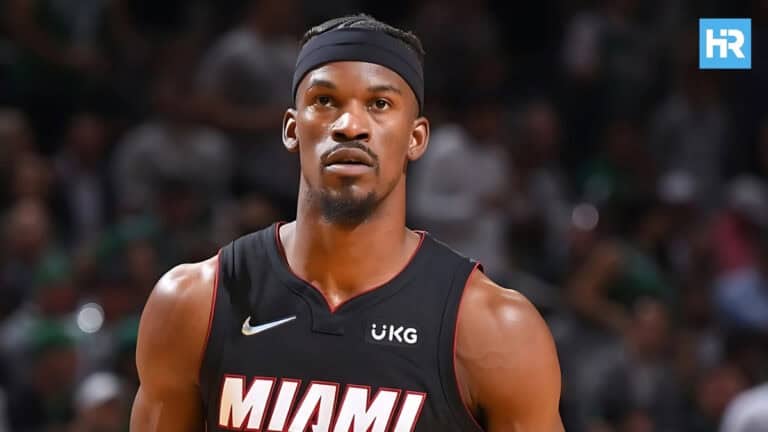
Let’s get this straight: the Knicks shouldn’t trade for Jimmy Butler.
Right now, New York is rolling with a 24-10 record and one of the best starting lineups in the NBA.
They’re contenders, but even great teams have weaknesses, and for the Knicks, it’s size and depth.
Trading for Butler, a 35-year-old star with a massive contract, doesn’t solve those issues.
Sure, Butler is a playoff warrior and a proven leader, but his age and contract are a bad fit for a team with its core in place.
Trading for him would gut the Knicks’ depth, and Butler’s best years are probably behind him.
The Knicks need to focus on fixing their real problem: size.
- The Knicks are already elite. With a 24-10 record and a strong offensive core, New York doesn’t need a dramatic overhaul.
- Supersizing the lineup is the real priority. Championship teams are built on depth and size, which the Knicks are missing.
- The Jimmy Butler trade rumors don’t add up. His age, contract, and potential disruption to team chemistry make him a poor fit.
Size Is the Knicks’ Biggest Weakness
The Knicks are small, especially compared to Eastern Conference powerhouses like the Boston Celtics and Cleveland Cavaliers.
Both teams dominate with their size and physicality, and the Knicks’ current roster can’t match up.
Teams like the Atlanta Hawks and Houston Rockets have already exposed this flaw, and they beat New York by outmuscling them with versatile forwards and big men.
Look at the Knicks’ rotation.
Jalen Brunson, their star guard, is just 6’1”.
Josh Hart, a rebounding machine, is 6’4”.
Landry Shamet, the tallest guard in their bench rotation, is also 6’4”.
Meanwhile, the Cavs and Celtics roll out lineups with size and length at every position.
And if the Knicks want to seriously contend, they need to address this imbalance.
Why Butler Doesn’t Fit New York’s Plans
Let’s break down why Jimmy Butler isn’t the answer for the Knicks.
For starters, his contract is a massive commitment.
Butler is earning $48.8 million this season and has a $52.4 million player option for next year.
On top of that, he’s looking for an extension that would pay him over $100 million into his late 30s.
That’s a lot of money for a player whose best years are likely behind him.
Trading for Butler would also mean giving up multiple players to match his salary, which would thin out an already shallow roster.
And while Butler’s competitiveness and playoff experience are undeniable, he doesn’t solve the Knicks’ biggest issue: size.
The Knicks don’t need another star; they need depth and versatility to complement their core.
Supersizing the Knicks Is the Real Answer
Instead of chasing Butler, the Knicks should focus on adding size and versatility to their roster.
Mitchell Robinson could be the answer, but only if he’s healthy.
He’s a rim protector, a rebounder, and a defensive anchor.
But Robinson’s health is a big question mark.
After undergoing his second surgery to repair a stress fracture in his left ankle, Robinson’s return is uncertain.
The Knicks are taking a cautious approach to his recovery, but relying on him entirely would be a gamble.
If Robinson returns strong, he opens up many exciting possibilities.
One option is the “Twin Towers” lineup, pairing Robinson with Karl-Anthony Towns in the frontcourt.
Flanked by Jalen Brunson, Josh Hart, and someone like Mikal Bridges or OG Anunoby, this lineup would dominate on both ends of the floor.
Another option is staggering Robinson and Towns, using one to anchor the starting lineup and the other to lead the second unit; it would balance the team’s scoring and size throughout the game.
And if the Knicks want to lock things down defensively, pairing Robinson with Precious Achiuwa would create one of the league’s most formidable defensive units.
But again, this all depends on Robinson’s health.
His potential return is dangerously close to the February 6 trade deadline, which puts the Knicks in a tricky position, at the very least.
Do they gamble on his recovery or look for other options?
Trade Options to Address Size and Depth
If the Knicks decide they can’t rely on Robinson, they have a few trade options to shore up their frontcourt.
Precious Achiuwa, a practical choice, is on a one-year, $6 million deal.
He’s been a solid contributor off the bench, providing size and rebounding.
Jericho Sims, a backup big man, is another trade candidate, though his limited playing time makes him less valuable to other teams.
Miles McBride, who signed a three-year, $13 million extension, might also be on the table. Still, his production-to-salary ratio makes a trade unlikely unless the Knicks get a respectable return.
The Knicks are expected to be active at the trade deadline, but don’t expect any blockbuster moves.
This team has already made its big splash by acquiring Karl-Anthony Towns, who has reshaped their offense.
Now, it’s all about filling the gaps and adding the finishing touches.
The Messy Jimmy Butler Situation in Miami
While the Knicks should stay out of the Jimmy Butler sweepstakes, his situation in Miami is worth a closer look.
Butler has made it clear he wants out, even telling reporters, “I want to see me getting my joy back playing basketball. Wherever that may be.”
Frustrated with the Heat, Butler was suspended for seven games for “conduct detrimental to the team.”
Miami has since started listening to trade offers.
The problem is that Butler’s age and contract make him a tough sell.
Teams aren’t eager to pay nearly $50 million for a 35-year-old, especially one who wants an extension.
Miami also wants to avoid taking on long-term money in return, which limits its options.
The Phoenix Suns have been linked to Butler, but their main trade chip, Bradley Beal, has a massive contract that Miami isn’t interested in.
The Golden State Warriors and Memphis Grizzlies have also ruled themselves out, citing concerns over Butler’s age, injury history, and price tag.
One team that could make sense for Butler is the San Antonio Spurs.
Pairing Butler with Victor Wembanyama would give the Spurs a veteran leader to guide their young star.
San Antonio has the assets to make a deal, including players like Keldon Johnson and Zach Collins, plus future draft picks.
But even then, it’s not a sure thing.
Why the Knicks Need to Play the Long Game
The Knicks are in a great spot right now.
With a 24-10 record and a strong core of players, they’re already one of the best teams in the league.
However, they must focus on fixing their size and depth issues to take the next step.
Trading for Jimmy Butler might seem exciting, but it wouldn’t solve their real problems.
Instead, they must focus on supersizing their roster and waiting for Mitchell Robinson to recover.
If they make smart moves at the trade deadline, the Knicks can put themselves in an even better position to compete with the best teams in the league.
The Eastern Conference is tough, but the Knicks have what it takes to succeed if they play it smart.









